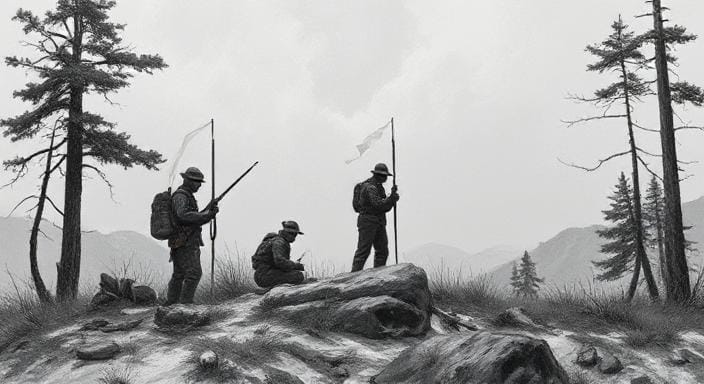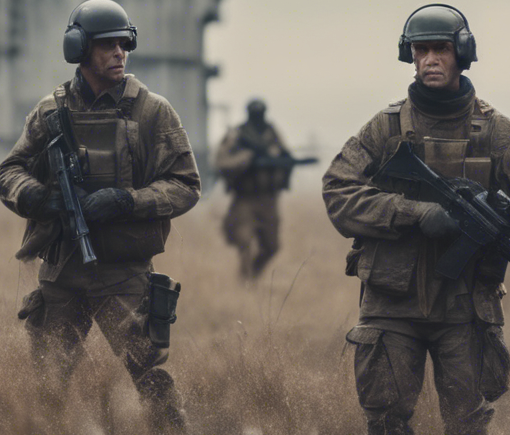Top Takeaways and Key Concepts
- Establish a sentry to monitor camp and detect threats before they escalate.
- Choose a high, concealed lookout point for better visibility and safety.
- Use clear hand signals or codes for silent group communication during watch.
- Stay alert by engaging your senses, moving often, and avoiding distractions.
- React calmly to threats using preplanned strategies for animals or strangers.
Summary of This Article
This article explains the importance of sentry duty while camping or surviving in the wilderness. A sentry acts as the camp’s lookout, staying alert for dangers like wildlife or suspicious people. The article emphasizes choosing a good lookout location with cover and a clear view. It highlights the need for strong communication, using hand signals or simple alerts to warn others without causing panic. Staying alert requires focus, movement, and awareness of surroundings. The article also offers tips on identifying potential threats early and handling them safely. With practice, sentry skills improve camp security and peace of mind.
Short Video Version of this Article
It’s just as important to know how to build a fire or clean water while you’re out in the wild, whether it’s for a weekend camping trip or a longer survival journey.

Please Note: This post may contain affiliate links. If you click one of them, we may receive a commission at no extra cost to you. As an Amazon Associate, I earn from qualifying purchases.
Learn how to be a sentry! It’s not enough to just look at trees and hope nothing awful occurs; you have to be proactive, vigilant, and ready for anything. So, let’s talk about how to keep an eye on your camp while still enjoying the great outdoors.
Understanding What a Sentry Does

First of all, what does it mean to be a sentry? You are the protector of your gang. Your main responsibility is to keep an eye out for any possible hazards, whether they are animals hunting for an easy meal or other campers who might not have the finest intentions. It’s like being on lookout duty in hide-and-seek, but with more at risk!
When I first learned about sentry duty in a wilderness survival training, I was astonished by how much there was to think about. It wasn’t simply about staying awake (albeit that does help).
You need to pay attention to what’s going on around you. Listen for strange noises and look for movement that doesn’t seem right. Have you ever heard how strange sounds are in the woods at night? A twig breaking may be a deer or something far worse, like my friend trying to sneak up on me for a prank!
Picking the Right Place
Let’s speak about where you should stand now that you know what being a sentry means. The best place should let you see without putting you in danger. A high place is ideal since you can observe more without putting yourself in too much danger.
I volunteered to be a sentry one night last summer when we camped near a lake. I located a high rock structure that gave me great sightlines and hid me among some plants. I could see our campsite plainly while I sat there drinking hot cocoa (yeah, even sentries deserve treats).
You will feel safer and everyone else will be able to relax and enjoy their time around the campfire without worrying about hidden hazards if you choose wisely where to stand guard.
Talking is Important
One thing I’ve discovered from my travels is that how well you talk to people may make or break your security efforts. If you’re on watch duty, having clear signals with your group will assist them know if something’s wrong without making them worry.
For instance, on our last trip, we made up basic hand signals. One finger up meant “all clear,” two fingers meant “there might be trouble nearby,” and raising both arms wildly meant “run!” Okay, maybe not quite as dramatic, but you get the point!
If you’re going to talk instead of using hand signals (which also works well), make sure everyone learns important terms ahead of time. This way, if something weird happens, like a rustle in the woods or strange noises, they would know right away what to do next.
How to Stay Alert: Tips and Tricks
It’s hard to stay awake when all you want to do is sleep. But there are techniques to stay focused when on watch duty so you don’t end up snoring louder than Bigfoot.
I have learned that using all of my senses is quite helpful. Instead of completely zoning out while staring into space like someone sitting at an airport terminal gate forever (we’ve all been there), try to focus on the different sounds around you, such the wind rustling leaves or the calls of animals far away, and name them in your head.
Another trick? Get up and move about every now and then! Changing postures keeps blood flowing and makes it difficult to get tired. Find ways to stretch discreetly every now and then if you can. Believe me, it works!
Also, don’t forget to bring refreshments! Eating snacks is a great way to keep your mind busy and your body fed, so you won’t get bored. You might even come up with new snack tastes based on what you see in nature along the route!
Teaching Your Eyes
To be observant, you need to do more than just look; you also need to train your eyes to see things that other people might miss. For example, instead of just looking at forms moving through shadows, look at how the colors of the leaves change to show that something is moving nearby.
A long time ago, I went camping with some friends and we had an unforgettable trip. I remember the “bear incident” very well. We were heading back after dark when I saw something moving behind some bushes a few yards away. It turned out to be bears going through trash that negligent campers had left behind! Things could have gone differently if I hadn’t been paying close attention.
Try to spot animals before they see you whenever you can, even if it’s just wandering through parks back home.
With patience comes better awareness, which eventually brings us back to feeling safe in the woods with our groups, united against the threats that lurk outside the warm glow of campfires.
How to Handle Threats: Tips
So, what do you do if you see something dangerous? First of all, don’t panic! Do you remember the hand signals we talked about before? Use them wisely here as well; talk to other campers calmly about any threats you’ve seen right away instead of letting dread take over for no reason.
Depending on the type of threat (animal encounter vs. human intrusion), strategies can be very different. For example, you might try to avoid danger or stand your ground with others until help arrives.
When dealing with wildlife (including bears!), keep in mind that common sense guidelines apply: create noise loud enough to get their attention but not so loud that they seem scared. Also, be aggressive enough to let them know they are not welcome in human land. For example, clap your hands together and say “go away!” These strategies are sometimes enough on their own, and they should help you avoid confrontation altogether.
In cases involving people, though, like shady people who come too close to campsites without being invited, we need to talk to each other a lot ahead of time to set rules based on past conversations about safety measures taken ahead of time. We also need to make sure that there are clear lines between strangers and friends, depending on the situation we find ourselves in every day.
Conclusion: Always Be Ready
In the end, mastering sentry skills takes practice, but it’s worth it because it keeps us safe on all kinds of trips with trusted friends as we explore nature without worrying about the dangers that are always there, no matter how prepared we think we are or how invincible we seem to be against the odds stacked against us.
So, remember to carry those reliable tactics with you the next time you go outside. Pack light, be alert, and keep a close eye on your surroundings so you can make memorable memories together while securely enjoying every moment under the stars!
Frequently Asked Questions
What is the purpose of a sentry while camping?
A sentry’s role is to keep watch over the campsite and detect potential dangers before they become threats. This includes watching for wildlife, unfamiliar people, or unusual activity in the surrounding area.
Where should a sentry position themselves for the best visibility?
The ideal sentry position is on high ground or in a concealed location that provides a clear view of the area while keeping the sentry safely hidden from potential threats.
How can campers communicate silently during watch duty?
Groups should establish simple hand signals or visual cues before starting sentry rotations. This allows quiet communication, avoiding loud noises that could attract wildlife or alert unwanted visitors.
How do I stay alert during long watch shifts?
Staying alert requires engaging all your senses, moving periodically to prevent fatigue, and avoiding distractions like phones. Light snacks or stretching can also help maintain focus.
What should a sentry watch and listen for?
A sentry should stay aware of movement, unusual sounds like snapping branches, changes in the environment, or behaviors that seem out of place—these could indicate nearby danger.
How should I handle a dangerous wildlife encounter while on watch?
Remain calm and alert the group quietly using signals. Make noise to scare the animal away if it approaches, but avoid provoking it. Never run—stand your ground and back away slowly if needed.
What’s the best way to prepare a group for emergencies during sentry duty?
Before camp is set, establish escape routes, safe zones, and emergency plans. Practice drills and make sure everyone understands signals and roles in case a real threat appears.
Suggested Resources:
Sentry Skills Training Guide
https://www.survivalresources.com/sentry-skills-guide
Wilderness Survival Techniques
https://www.outdoorlife.com/wilderness-survival-techniques
Bear Safety Guidelines
https://www.nps.gov/articles/bear-safety.htm

Kevin Collier is a seasoned outdoor enthusiast and writer for Trekbug.com, specializing in outdoor adventures, survival strategies, and prepping insights. With a deep love for nature and a commitment to self-sufficiency, Kevin empowers readers to embrace the wilderness confidently. He shares valuable tips, practical techniques, and inspiring stories, helping both novice and experienced adventurers develop essential skills for surviving and thriving in the great outdoors.





